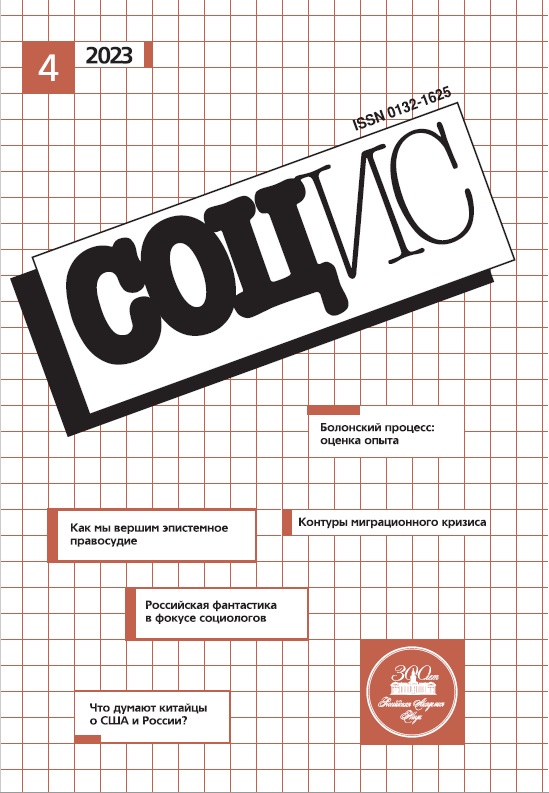Russian science fiction in the Genre of Alternative History as a Reflection of Mass Consciousness: Sociological Approaches
- Authors: Abramov R.N.1,2
-
Affiliations:
- National Research University Higher School of Economics
- Institute of Sociology of the Federal Center of Theoretical and Applied Sociology of the Russian Academy of Sciences
- Issue: No 4 (2023)
- Pages: 106-116
- Section: Articles
- URL: https://edgccjournal.org/0132-1625/article/view/661634
- DOI: https://doi.org/10.31857/S013216250024079-9
- ID: 661634
Cite item
Abstract
In Russia, fiction in the genre of alternative history has become popular over the past ten years. Book series of this kind are actively published and have a significant readership. This genre is part of ideological and utopian landscape of the Russian mass consciousness. It helps to understand imperial historical traumas, nostalgia for the Soviet past, and a high level of anxiety about the present and future. The theoretical part of the analysis is based on the G. Rosenfeld ideas about a close connection of this genre with the experience of the present and about ontological pluralization of the past. The article also includes M. Laruelle's thesis about the ideological function of this genre and its role in ideological mobilization. The concept of E. Shatsky's utopia as a chronic escapism is an important element in the analysis of this genre in Russia. Russian science fiction in the genre of alternative history mirrors ideological and utopian unconscious, which articulates affective historical traumas of society. Alternative history novels actively experiment with genres, and it contains elements of a political detective story, adventure and spy novel, conspiracy theories, personal nostalgic memoirs about childhood and adolescence, mysticism, military action movie, romance, crypto-fiction. Many authors perceive their novels as a historical experiment, and they are concerned with problematizing the causes of the collapse of the Soviet Union. The modern Russian wave of science fiction in the genre of alternative history is a more painful reaction of a part of society to the deep historical faults associated with the collapse of the USSR. The source of the analysis is the materials of interviews with the authors of works in the genre of alternative history, readers' reviews on thematic online platforms and the content of the works.
Keywords
About the authors
Roman N. Abramov
National Research University Higher School of Economics; Institute of Sociology of the Federal Center of Theoretical and Applied Sociology of the Russian Academy of SciencesMoscow, Russia
References
- Абрамов Р.Н. Советские технократические мифологии как форма «теории упущенного шанса»: на примере истории кибернетики в СССР // Социология науки и технологий, 2017. № 2. С. 61–78.
- Беньямин В. Судьба и характер. СПб: Азбука, 2021.
- Болтански Л. Тайны и заговоры. По следам расследований. СПб: ЕУ, 2016
- Гудков Л., Дубин Б. Литература как социальный институт. М.: Новое литературное обозрение, 1994.
- Данилова Е.Н. Дискурс выигравших и проигравших в российских трансформациях // Социологические исследования, 2014. № 5. С. 16–26.
- Джеймисон Ф. Постмодернизм, или культурная логика позднего капитализма. М.: Институт Гайдара, 2019.
- Жаворонков А.В., Левашов В.К., Образцов И.В., Ростовцева Л.И., Романовский Н.В., Трофимова И.Н., Черныш М.Ф., Демиденко С.Ю. Неостывающая память (круглый стол) // Социологические исследования, 2020. № 5. С. 3-17
- Завадский А., Склез В., Суверина К. Предисловие. Разум и чувства: публичная история в музее // Политика аффекта: музей как пространство публичной истории. М.: Новое литературное обозрение, 2019. С.7–51.
- Мангейм К. Идеология и утопия // Мангейм К. Диагноз нашего времени. М.: Юрист, 1994. С. 52–147.
- Нефедов С.А., Розов Н.С., Трубицын Д.В., Романовский Н.В. Россия: из прошлого в будущее (круглый стол по книге Б.Н. Миронова) // Социологические исследования. 2022. № 3. С. 24–39.
- Хауэлл И. Апокалиптический реализм. Научная фантастика Аркадия и Бориса Стругацких. СПб.: БиблиоРоссика, 2021.
- Шацкий Е. Утопия и традиция. М.: Прогресс, 1990.
- Borenstein E. Plots against Russia. Conspiracy and Fantasy after Socialism. London: Cornell University Press, 2019.
- Hellekson K. The Alternate History: Refiguring Historical Time. Kent: The Kent State University Press, 2000.
- Laruelle M. Conspiracy and Alternate History in Russia: A Nationalist Equation for Success? // The Russian Review. 2012. Vol. 71. No. 4. P. 565–580.
- Powell Z.M. The Ethics of Alternate History. Melodrama and Political Engagement in Amazon’s The Man in the High Castle // South Atlantic Review. 2018. Vol. 83. No. 3. P. 150–169.
- Rosenfeld G.D. The World Hitler Never Made: Alternate History and the Memory of Nazism. Cambridge: Cambridge University Press, 2005.
- Thiess D.J. Relativism, Alternate History and the Forgetful Reader. Reading Science Fiction and Historiography. London: Lexington Books, 2015.
Supplementary files










